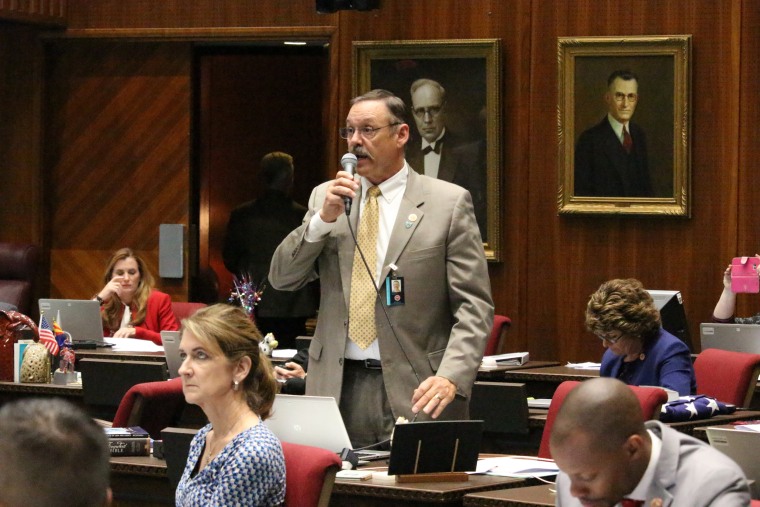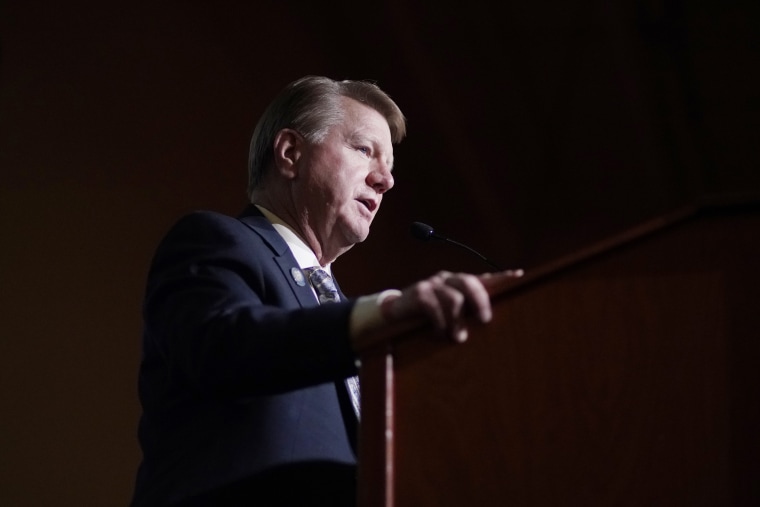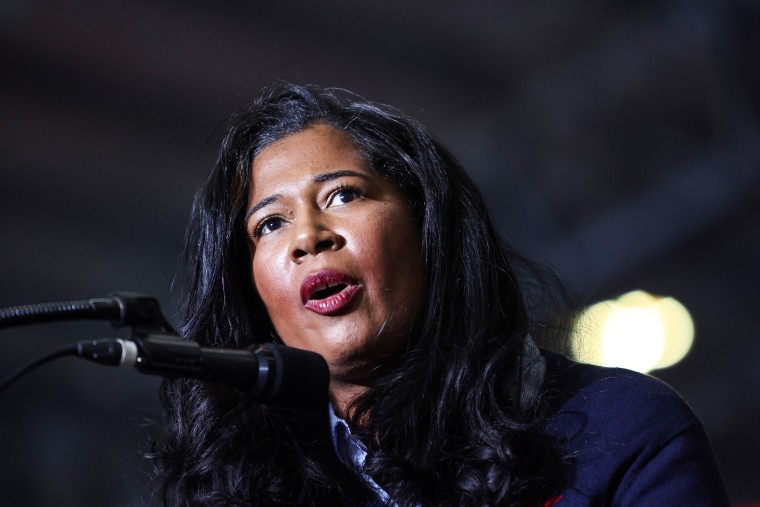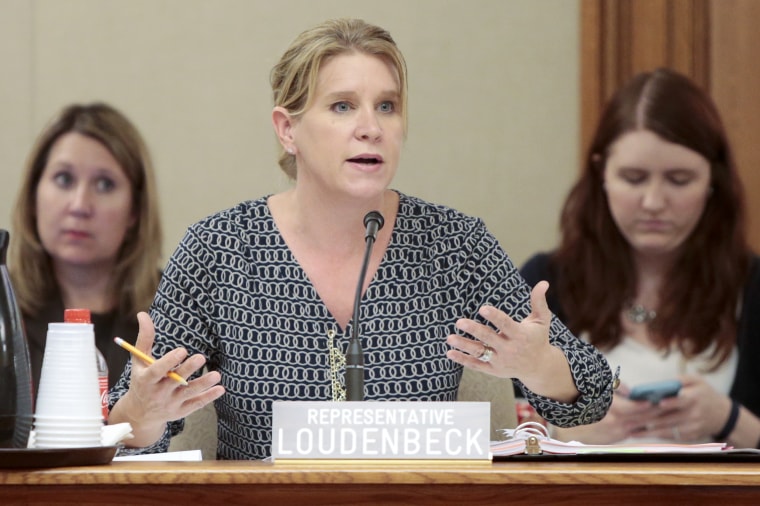In pivotal battleground states across the U.S., intensely partisan candidates who falsely claim that Donald Trump won the 2020 presidential election are running for secretary of state.
As contenders to become the top election official in their respective states, these candidates, if they win, would in almost all cases oversee the state office administering the 2024 presidential election — in which Trump might be the Republican nominee. Some experts say that scenario could contribute to an even more robust effort to overturn the next presidential election.
“These are the positions that hold the keys to our democracy and the keys to our elections,” said Joanna Lydgate, the CEO of States United Action, a nonpartisan group that tracks secretary of state and gubernatorial races. “We don’t put toddlers in charge of nap time, and we shouldn’t put election deniers in charge of elections,” she added.
At least 23 people who deny the results of the 2020 election are running for secretary of state in 19 states across the U.S., according to the group — a number that has alarmed voting and elections experts. Four of those states — Arizona, Georgia, Michigan and Nevada — are ones in which Biden scored his narrowest victories in 2020.
Over the next two years, these elected officials would then have the power to not only transform how elections are run — in ways some experts say could help possible candidate Trump — but to also tip the scale in a close race, the way Trump asked Georgia Secretary of State Brad Raffensperger to do in 2020.
“If we’d had some of these election deniers in some of these secretary of state positions in states like Michigan and Georgia and Arizona in 2020, I think we could have seen a very different outcome in 2020,” said Lydgate. If they win, she said, “they would have the power to change the rules, and also, ultimately, if they did not like the results of the election, to overturn it.”
Lydgate and others have urged voters to “pay attention to who is running” in these traditionally sleepy, down-ballot races “and to what they said.”
Here is what some of the candidates in these states have said about the 2020 election and their approach to administering future races.
Arizona: Mark Finchem

Finchem, a member of the Arizona Statehouse, is among the most outspoken lawmakers who insist Trump won the 2020 election in Arizona, and nationally.
Trump endorsed Finchem last year, saying in a statement that “Mark was willing to say what few others had the courage to say,” about the 2020 race.
At a Trump rally in January in Florence, Finchem, standing alongside the former president, said, “Ladies and gentlemen, we know it and they know it — Donald Trump won.”
Neither Finchem nor his his campaign responded to emails and phone calls from NBC News requesting comment.
As a state legislator, Finchem has introduced several controversial election-related bills, including one that would make all voters’ ballots public records, searchable in an online database. Finchem also introduced several resolutions seeking to decertify the results of the 2020 election in three major counties in the state, and a bill that would give the Legislature the power to reject election results. He’s also been an outspoken proponent of a partisan review of Maricopa County’s election results, even though the review reaffirmed Biden’s victory.
Finchem, who has appeared on QAnon radio talk shows, attended the “Stop the Steal” rally in Washington, D.C., on Jan. 6, 2021, which led to the storming of the Capitol. He spoke at a “Stop the Steal” event a day earlier, telling the crowd that Trump had won the 2020 election. In a 2014 interview with local news outlet InMaricopa.com, Finchem identified himself as a member of the Oath Keepers, a far-right militia group whose founder was charged with seditious conspiracy and other counts, in connection with the Jan. 6 insurrection.
NBC News previously reported that the House committee investigating the Jan. 6 insurrection had subpoenaed Finchem, seeking more information about his claims that the election was “rigged” and his communications with organizers of the “Stop the Steal” rally on Jan. 6.
“We need secretaries of state who uphold the will of the people, regardless of the outcome,” Jena Griswold, Colorado’s secretary of state and the chair of the Democratic Association of Secretaries of State, said of candidates like Finchem. Griswold’s opponent this fall, Republican Tina Peters, has also said she believes Trump won the 2020 election.
Nevada: Jim Marchant

Marchant, a former Nevada state legislator who unsuccessfully ran for Congress in 2020, is a member of the pro-Trump America First Secretary of State Coalition, which also includes Finchem, Kristina Karamo of Michigan and Jody Hice of Georgia.
In an interview with NBC News, Marchant said he continues to believe that Trump beat Biden in Nevada, and is the winner of the 2020 election.
“It’s almost statistically impossible that Joe Biden won,” he said. (Biden beat Trump in Nevada by almost 34,000 votes — a result approved by the state’s Supreme Court.)
He said he would not have certified the 2020 election if he had been the secretary of state, and wouldn’t rule out, if he was to hold the office in 2024, advocating for an alternate slate of Trump electors if Trump were on the ballot. (Marchant pushed for an alternate slate in 2020.)
Marchant, if elected, said he would get rid of all electronic voting machines, voting by mail, early voting and institute a “traceable paper-ballot-only” system that institutes only hand counts.
Nevertheless, he told NBC News that he would honor the state’s results of the 2024 election if he were the one overseeing it in Nevada, even if Trump lost in the state.
Michigan: Kristina Karamo

In Michigan, state Republicans on Saturday endorsed Kristina Karamo as their party’s nominee for secretary of state, all but ensuring she’ll face off against Democratic incumbent Jocelyn Benson in November.
Karamo, who Trump endorsed last year and who campaigned for her during a Detroit-area rally earlier this month, has repeatedly cast doubt on the result of the 2020 race, and has dabbled in discredited conspiracy theories surrounding it.
Karamo, a 36-year-old part-time educator at a Detroit-area community college, worked as a Detroit poll challenger in 2020. In that role, Karamo claimed she witnessed fraudulent absentee ballot counting and testified before a Michigan Senate committee investigating election fraud allegations (the panel found no evidence of widespread or systematic fraud in the state’s election).
Karamo has also said she believes Trump won Michigan in 2020 (Biden won the state by more than 154,000 votes), and that left-wing anarchists planned the Jan. 6 attack on the U.S. Capitol.
The Karamo campaign did not respond to emails from NBC News requesting comment.
Georgia: Jody Hice

In Georgia, Republican Rep. Jody Hice is challenging incumbent Republican Secretary of State Brad Raffensberger, whom Trump has repeatedly bashed after he refused Trump’s demand, which the former president made in a taped phone call, to “find” him enough votes so that he, and not Biden, would win Georgia’s 16 electoral votes.
Hice, whom Trump endorsed last year, voted to reject the state-certified election results in Georgia and Pennsylvania on Jan. 6, even after a mob of Trump supporters stormed the Capitol. In a since-deleted Instagram post on the morning of Jan. 6, Hice wrote, “This is our 1776 moment.”
Hice was also among several Republican members of Congress who were involved in a planned effort to pressure Vice President Mike Pence to overturn the 2020 election by discarding electoral votes from certain states won by Biden, The New York Times reported last week, citing recent testimony given to the House committee investigating the Jan. 6 insurrection.
The Hice campaign did not respond to emails from NBC News requesting comment.
Wisconsin: Jay Schroeder and Amy Loudenbeck

Unlike in Michigan, Arizona, Georgia and Nevada, in Wisconsin the secretary of state does not oversee elections. That responsibility belongs to the Wisconsin Elections Commission, the bipartisan state agency created by Republicans.
Schroeder and Loudenbeck, however, have both called for the dismantling of the commission.
Both candidates have instead called for the secretary of state’s office to oversee and administer elections. In Wisconsin, that office has not had responsibility for elections since 1974. Changing that would require approval by the Republican-controlled Legislature and the governor. Democratic Gov. Tony Evers has said he would not approve such changes, but he is up for re-election this fall, and all of his Republican opponents have vowed to abolish the Wisconsin Elections Commission. Other state Republicans have also aggressively criticized the agency following Biden’s 2020 win in the state.
While Trump has not made an endorsement in the state’s Republican primary, he’s been heavily involved in persuading other Republican lawmakers in Wisconsin to continue investigating the results of the 2020 election.
In an interview with NBC News, Schroeder, who was the Republican nominee for secretary of state in 2018, wouldn’t acknowledge whether Biden won the state in 2020. Biden beat Trump in Wisconsin by 20,600 votes.
He said that if he’d been the secretary of state during the 2020 race, and if the office at that time had had the authority to do so, he wouldn’t have certified Biden’s win.
“I wouldn’t have signed off on the results,” he said.
Schroeder added that if he were to hold the office in 2024, and if the office had the power to certify elections, and if Trump were the GOP nominee, he would not explicitly commit to recognizing a Democratic winner if Trump lost.
“There would have to be proof,” he said.
Loudenbeck, a state assemblywoman who represents a district in southern Wisconsin, said in an email that the Wisconsin Election Commission was “broken,” and that “many election related duties” should be “transferred in whole or part to the office of the secretary of state.”
Asked if she would commit to honoring the results of the 2024 election in Wisconsin, she wrote, “I am committed to doing whatever I can to help resolve all of the issues raised by various audits and investigations so that we all feel confident in any election result.”
Source: | This article originally belongs to Nbcnews.com










